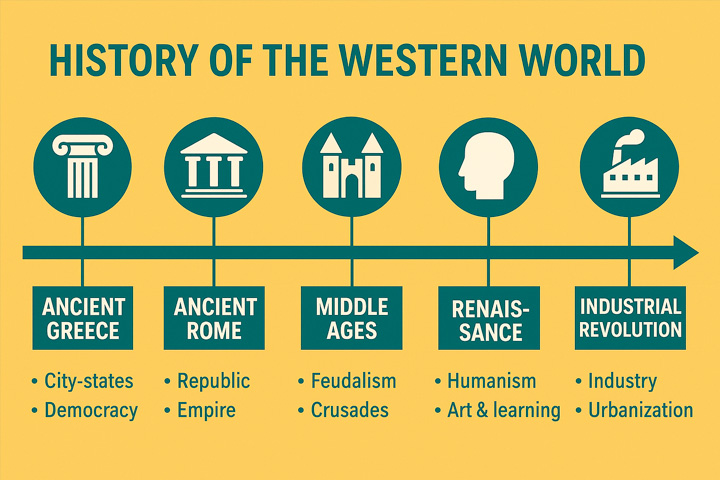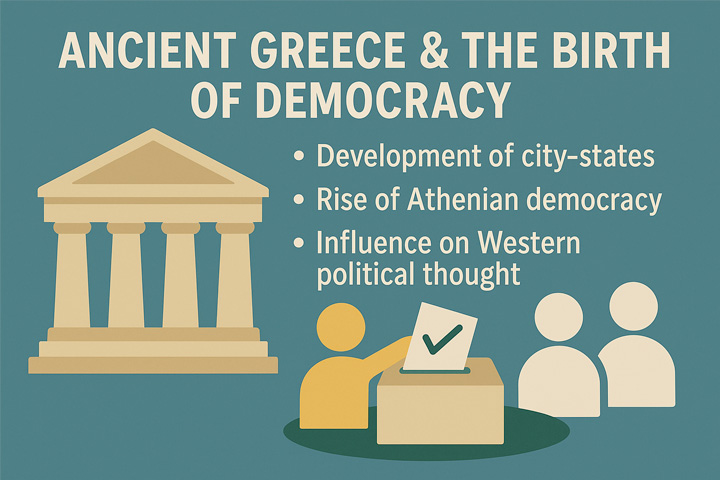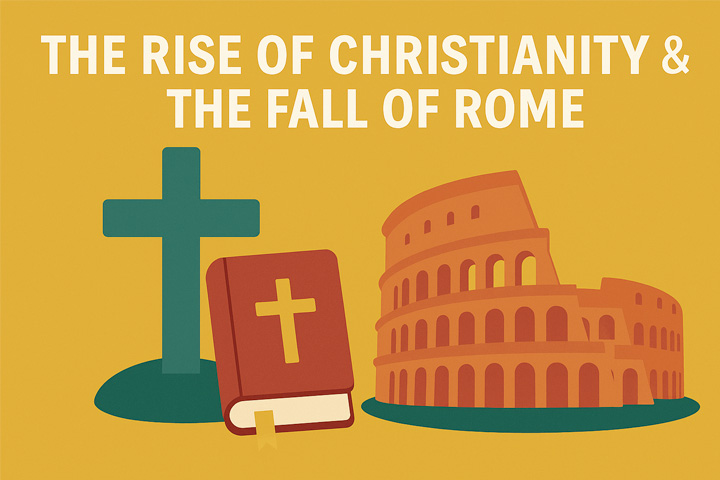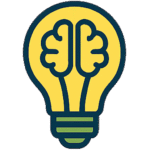A Brief History of the Western World
This section provides a streamlined journey through the major turning points that shaped the modern Western world; from ancient democracies to industrial powerhouses. Scroll through for key concepts, bullet-point summaries, and simple visuals to connect the dots. [A Brief History of the Eastern World]

🏛 Ancient Greece & the Birth of Democracy
Summary:
Western political philosophy begins with Ancient Greece. Its experiment in democracy, especially in Athens, planted the seeds of citizen-led government and civic duty.
Key Points:
- First known democracy emerged in Athens (~5th century BCE)
- Citizens voted directly on laws and policy (direct democracy)
- Influenced modern concepts of civic participation, jury duty, and debate

🏗 Ancient Rome & the Republic
Summary:
Rome built on Greek ideas, creating a republic with checks and balances; an idea that deeply influenced U.S. and European governments.
Key Points:
- Roman Republic (509–27 BCE) emphasized elected officials and separation of powers
- Senate, consuls, and legal systems formed the foundation for modern law
- Later shifted into an empire under Augustus
✝️ The Rise of Christianity & the Fall of Rome
Summary:
As Rome declined, Christianity spread, eventually becoming Europe’s dominant spiritual and political force. The fall of Rome triggered centuries of decentralization.
Key Points:
- Christianity became Rome’s official religion in 380 CE
- Western Roman Empire collapsed in 476 CE
- Led to the power vacuum that created the Middle Ages

⚔️ The Middle Ages (500–1500 CE)
Summary:
A thousand-year period of feudalism, limited literacy, and strong Church influence. Yet, it also laid the groundwork for future innovation and national identity.
Key Points:
- Society was structured under feudal lords and vassals
- Catholic Church dominated politics and education
- Crusades and trade revived contact with the East
- Universities and towns began to emerge in later centuries
💡 The Renaissance (1300s–1600s)
Summary:
The Renaissance was a cultural rebirth rooted in classical ideas, sparking advances in art, science, and human potential.
Key Points:
- Focus on individualism, secularism, and humanism
- Advances in anatomy, astronomy, and literature (e.g., Galileo, Shakespeare)
- Spread by the printing press (invented c. 1440)
✊ The Reformation (1500s)
Summary:
A religious revolution that split the Catholic Church and altered the political landscape of Europe.
Key Points:
- Martin Luther’s 95 Theses (1517) challenged Church practices
- Birth of Protestantism → religious wars and reforms
- Shift in power from Church to emerging nation-states
🗺 The Age of Exploration (1400s–1600s)
Summary:
Driven by trade, conquest, and curiosity, European powers explored and colonized vast parts of the globe.
Key Points:
- Portugal and Spain led early expeditions (e.g., Columbus, da Gama)
- Colonization reshaped the Americas, Africa, and Asia
- Native populations devastated by disease and conquest
🔥 The Enlightenment (1600s–1700s)
Summary:
A movement emphasizing reason, liberty, and progress that influenced revolutions and constitutional democracies.
Key Points:
- Philosophers like Locke, Rousseau, and Voltaire questioned monarchy and tradition
- Promoted rights, freedoms, and scientific thinking
- Set the intellectual foundation for the American and French Revolutions
🧨 The American & French Revolutions
Summary:
Two transformative revolutions that challenged monarchy and inspired global movements for democracy and equality.
Key Points:
- American Revolution (1775–1783) created a new democratic republic
- French Revolution (1789–1799) overthrew monarchy, sparked political chaos
- Both shaped global concepts of citizenship, rights, and governance
🏭 The Industrial Revolution (1700s–1800s)
Summary:
A period of dramatic economic and technological change that reshaped how people worked, lived, and interacted.
Key Points:
- Mechanization of factories, especially in Britain
- Urbanization and rise of working-class struggles
- Inventions like the steam engine, cotton gin, and railroads
⚖️ The World Wars (1914–1945)
Summary:
Two global conflicts that redefined borders, power structures, and global cooperation.
Key Points:
- WWI: sparked by assassination, alliances, trench warfare
- WWII: rise of fascism, genocide, atomic bombs
- Led to the creation of the United Nations and Cold War dynamics
🛰 The Cold War & Modern Western World
Summary:
A long rivalry between the U.S. and Soviet Union that shaped international politics, economics, and military strategy through the 20th century.
Key Points:
- Nuclear arms race, space race, proxy wars (Vietnam, Korea)
- Collapse of Soviet Union in 1991
- Western democracies dominate global culture and trade
Some important historic moments you should check out:
American Revolution (timeline/causes/consequences)
Civil Rights Movement (key people, laws, protests)
World Wars I & II (why they started, U.S. involvement)
The Cold War (with a simple East vs. West map)
Watergate & U.S. Scandals
Other Topics
[Word Usage & Grammar Fixes] [U.S. Constitution] [History of the Eastern World] [Early Democratic Party] [Early Republican Party] [Major Religions of the World] [The Traditional Nuclear Family] [Major Political Systems of the World] [American Participation in Wars & Conflicts] [Decolonization & Modern Conflicts] [World Religions Overview] [Scientific & Technological Revolutions] [How Laws Are Made (Bill → Law Process, State vs. Federal)] [Local Government 101: Mayor, City Council & School Boards] [Student Loans & Grants: What You Need to Know] [Taxes Simplified: W-2, W-4 & Filing Basics] [Credit Scores Explained: How They Work & Why They Matter] [Buying vs. Renting: Pros & Cons] [Moving Out Checklist: First Apartment Essentials] [Roommate Agreements & Etiquette] [Spotting Misinformation in the AI Era] [Debate & Discussion Skills: Arguing Respectfully & Persuasive Writing] [Online Privacy & Digital Footprints] [Car Basics: Maintenance, Insurance & Registration] [Healthcare Basics: Insurance & When to Go Where] [Cooking Basics: Easy Meals & Smart Shopping] [Emergency Situations & Preparedness] [Car Buying & Leasing 101] [What to Do If You Get Into a Car Wreck?] [Major Political Systems of the World] [The Traditional Nuclear Family] [Major Religions of the World] [History of the Eastern World]

